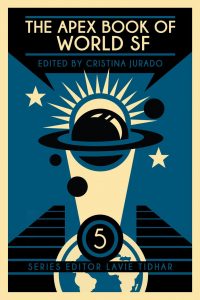 various translators
various translators
September 27, 2018
304 pages
(read my review of The Apex Book of World SF 4)
It’s a very good day when we get another volume in the Apex Book of World SF series, begun by Lavie Tidhar (series editor) and Apex nearly a decade ago. All five volumes feature some of the greatest speculative fiction you’ll ever read from around the world, including stories that have been translated into English from other languages. In Volume 5, editor Cristina Jurado focused not just on finding great stories but also on representing parts of the world that hadn’t received as much attention in previous volumes. The result is a collection that takes you from Singapore to Venezuela, Germany to Egypt, and many places in between. Here ghosts rub shoulders with untamed code, androids that are indistinguishable from humans cross paths with 3D-printed food, and space and time suddenly seem much more complex and beautiful. Here’s the list of stories:
Vina Jie-Min Prasad (Singapore) — “A Series of Steaks”
Daína Chaviano (Cuba, translated by Matthew D. Goodwin) — “Accursed Lineage”
Darcie Little Badger (USA/Lipan Apache) — “Nkásht íí”
T.L. Huchu (Zimbabwe) — “Ghostalker”
Taiyo Fujii (Japan, translated by Jim Hubbert) — “Violation of the TrueNet Security Act”
Vandana Singh (India) — “Ambiguity Machines: An Examination”
Basma Abdel Aziz (Egypt, translated by Elisabeth Jaquette) — “Scenes from the Life of an Autocrat”
Liliana Colanzi (Bolivia, translated by Jessica Sequeira) — “Our Dead World”
Bo-young Kim (South Korea, translated by Jihyun Park & Gord Sellar) — “An Evolutionary Myth”
Israel Alonso (Spain, translated by Steve Redwood) — “You Will See the Moon Rise”
Sara Saab (Lebanon) — “The Barrette Girls”
Chi Hui (China, translated by John Chu) — “The Calculations of Artificials”
Ana Hurtado (Venezuela) — “El Cóndor del Machángara”
Karla Schmidt (Germany, translated by Lara M. Harmon) — “Alone, on the Wind”
Eliza Victoria (Philippines) — “The Seventh”
Tochi Onyebuchi (Nigeria/USA) — “Screamers”
R.S.A. Garcia (Trinidad and Tobago) — “The Bois”
Giovanni De Feo (Italy) — “Ugo”
I had already read many of these before getting my hands on this collection, and some I had read a few years ago. WSF5 was an opportunity for me to reread those stories (which I rarely do these days because my TBR stack is always yelling at me). In many cases, I loved the story even more the second time. Fujii’s “Violation of the TrueNet Security Act” is always a fun, gripping piece, but now that I’ve also read Gene Mapper and Orbital Cloud, I can better appreciate Fujii’s ability to seamlessly weave in discussions about code into his larger story of a post-Internet world. His hard-sf stories are such a joy to read. Colanzi’s “Our Dead World,” too, was even better the second time. I had first read it in her collection of the same name, but reading it in relation to other writers’ stories offered an interesting new perspective on her tale of Mars and the stress of living on another planet.
I first encountered Chi Hui’s “Calculations of Artificials” and Karla Schmidt’s “Alone, On the Wind” in audio versions, and reading the text allowed me to notice details that I had missed before. Chi Hui’s chilling and sorrowful story about “artificials” trying to keep humans apart (so they wouldn’t kill each other in yet another nuclear war) goes to the heart of what it means to be human and come into conflict with other humans. Does the elimination of violence and acts of rage mean that the species has changed beyond recognition? Can such elements ever be purged from humanity and should they? Like Chi Hui’s story, Schmidt’s is a long, complex tale about conflict and aggression, but this time the war is between humans living on a desolate earth and a different species of human living on the shattered rocks hanging above the earth. We so rarely get German SFT these days, and “Alone, On the Wind” is a lovely example.
Other favorites include “A Series of Steaks” (which I read here for the first time and absolutely love), “Ghostalker,” “You Will See the Moon Rise,” “Ambiguity Machines: An Examination,” and “Ugo.”
Anthologies like The Apex Book of World SF 5, such as Future Fiction: New Dimensions in International Science Fiction (which came out earlier this year), offer readers a glimpse of the literary riches that the world has to offer. Of course, I always want more translations, but I’m thankful for what we have so far, and look forward to five more volumes! (wink wink nudge nudge, Apex!)
